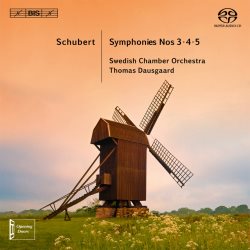|

|
Franz SCHUBERT (1797-1828)
Symphony No. 3 in D, D200 [23:16]
Symphony No. 4 in C minor, D417 [29:39]
Symphony No. 5 in B flat, D485 [28:02]
Swedish Chamber Orchestra/Thomas Dausgaard
rec. May 2009 (No. 5), January 2010 (No. 3), May 2010 and August 2011 (No. 4), Örebro Concert Hall, Sweden
Review FLACs downloaded from eClassical
BIS BIS-SACD-1786 [80:57]
Thomas Dausgaard’s Schubert symphony cycle picks up right where it left off with the previous volume, which is to say, at a very high standard of excellence. These are fleet, exciting, fiercely played readings, and the music thrives under this treatment. Hard-stick timpani, strong rhythmic accents and a very flexible approach to string vibrato are the hallmarks. You won’t hear much vibrato in some of the rapid passages of the Tragic Symphony, but in that one especially the violins become very expressive throughout the slow movement.
I’ve been a fan of many of the Swedish Chamber Orchestra recordings with Dausgaard. They’re probably one of the best chamber orchestras in the world, thrillingly precise and full of character. Also they’re not afraid to grab you by the collar and get in your face. Their spunky fire-and-brimstone take on Beethoven’s Third is one of the few interpretations that really demonstrates how revolutionary and shocking the work must have been. I think it predates the very similar Paavo Järvi album on RCA.
The SCO/Dausgaard Schubert Sixth was glorious, and their “Unfinished” restored the allegro to a speed not burdened by excessive morbidity or faux-profundity. If you know those performances, or if you appreciate the new chamber orchestra style that accounts for period practice, this is an easy recommendation. Indeed, the only let-down so far has been the Great C Major, curiously unsatisfying; try Charles Mackerras and the Philharmonia instead. You may disagree if you like your Fifth Symphony to be unyieldingly pastoral and easygoing: the tempos are, again, faster than usual, and some may think there is too great a sacrifice of charm.
I’ve been listening to these new albums more frequently than Harnoncourt’s benchmark Concertgebouw cycle, which sacrifices some excitement for a tiny — though bigger in No. 5 — gain in refinement and class. BIS’s sonics on the new CD are up to their usual high standards. The recording really packs a punch at climaxes, especially given the aggressive Swedish brass, so brace yourself. This is Schubert that’s really cookin’.
By the way, notice the playing time: 81 minutes.
Brian Reinhart
 |
 |
|














